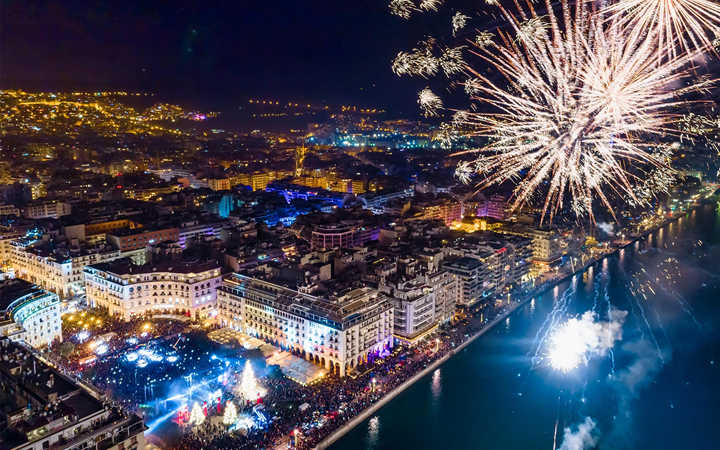One of the most pleasant aspects of Christmas in Greece is that the heavy commercialization that has taken over in the US during the last several decades is almost completely absent in Greece. On the other hand, just as elsewhere in the West, there are all kinds of light displays on the balconies of homes, as well as gaily decorated public spaces in city centers. Another thing that is nice about Christmas in Greece is that it is not the best or most popular religious holiday on the calendar. That would be Easter, or Pascha as it is known in Greece.
Although Greeks, like Christians and non-Christians alike the world over, love Christmas, they get far more excited about Easter: the cold, miserable rainy winter weather has finally been given over to soft, pleasant warmer days, plants are putting forth shoots, a picture of the new life that Easter celebrates, and the Pascha feast in Greece, with its goat and lamb traditionally roasted over a spit in the open air, its many side dishes accompanying the meal, and the free flow of wine and other beverages make it the most enjoyable day of the year in Greece.
Over the centuries, Christmas and New Year’s have become a sort of dual holiday, and that applies to Greece as well, with the exception that Epiphany is added in for good measure, stretching the holiday season into two full weeks. One distinctive where Greece differs from much of the West is that during this festive time, is that work slows down big time until the Feast of Epiphany on January 6th. While stores and offices remain open, the unspoken agreement is that the pace of work will slow down considerably.
That’s why if you want to get something done in Greece, especially something requiring the cooperation of the labyrinthine Greek bureaucracy, this is the worst time of year to attempt it. Greeks don’t just take Christmas day off; they also take Boxing Day (The 26th of December) off as well, because it, too is considered holiday.
Greece does have a number of distinctive Christmas traditions, none of which overshadow the reason for the holiday, which of course is the celebration of the birth of the central figure in the Orthodox tradition, and in all of the Christian world; Jesus of Nazareth.
That’s why the holiday begins and ends with the Church. The Feast of the Nativity is a three-day event. There is a night service on Christmas Eve during which Old Testament prophecies pointing to Christ are read. That’s followed, in traditional Orthodox services, by the Vesperal Divine Liturgy of St. Basil the Great. This liturgy is celebrated ten times a year in the Orthodox tradition, including Easter. It’s a very long service (5 hours), but there’s a lot of freedom to walk out of church at any time, take a break, and then pick it up again a bit later.
On Christmas eve day, and on into the evening, children from house to house, and to businesses clanging tiny triangles and singing Christmas carols, for which they are rewarded with a few coins. The carols, or “kalanda” are mostly Byzantine in origin. No God Rest You Merry Gentlemen-type hymns for Greece, thank you very much, although many western carols translated into Greek, and even Bing Crosby, Dean Martin, Frank Sinatra and even Elvis Presley songs and make their way into the Muzak PA systems of local shopping venues.
Christmas Day also brings with it a long liturgical service in the church with psalms of thanksgiving for the birth of the Savior of the world, as well as gospel readings of relevant passages, such as Luke Chapter 2. Although church attendance in Greece is still pretty heavy compared with Western Europe, not nearly as many go to church on Christmas day in Greece as they used to.
After the service celebrants head home to enjoy a festive meal together. Christmas day gifts, however, are often not exchanged. Traditionally Greeks wait until New Year’s day for gift giving, if they exchange gifts at all. This is probably the reason for the lack of commercialization of Christmas.
The Christmas meal could include traditional roast goat or lamb, but the main meat dish is usually pork. Abundant Greek side dishes are consumed, such as taramosalats (based on fish roe- it tastes much better than it sounds), tzatziki, eggplant salad and other. This would be followed by yummy Greek cookies, such as the melomakarona (ginger-flavored, walnut-topped and honey-soaked thick, oval cookies), or kourabiedes (circular shortbread-like cookies snowed under with powdered sugar).
The Greek Santa Claus is known as Agios Vasilios (St. Basil), who was a real person and one of the Three Hierarchs of the Church who lived in Asia Minor and established a tradition of giving gifts to the poor, usually money, at Christmas time.
You’ll also see a lot of beautifully lighted boats in public squares, harbors, and model boats in homes at Christmas time. These celebrate St. Nicholaos, the patron of the sea and sailors.
New Year’s
New Year’s Eve is celebrated with a midnight liturgy at the church, after which an unusual after midnight traffic jam ensues when everyone leaves home to visit family and friends and imbibe in drink and food as they play cards until dawn.
The most common tradition on New Year’s however, is the cutting of the Vasilopita, which is a large, round, airy cake-like bread in which a coin is buried. The cake is scored first in the sign of the cross, and is then divided into as many wedges as there are guests. Pieces are also cut for Christ, and sometimes St. Basil (Agios Vasilios), or the poor.
Whoever wins the coin, which in the old days had actual value but now is only symbolic, is considered especially blessed in the coming year. Thus begins the Epiphany season, which comes to an end with the Blessing of the Waters on Epiphany day.
Epiphany (Theophania)
Epiphany, or in the Eastern Orthodox tradition, Theophania- both terms mean “the revelation (or manifestation)” while Theophania means “the revelation of God-” celebrates the visit of the Magi to the Christ child, symbolic of Jesus’ revelation to the Gentile world.
The famous tradition on this day is the blessing of the waters, in which a procession, led by the local priest or Bishop, heads on down to the sea (or any body of water), where a cross is thrown in, blessing and cleansing the waters. A gaggle of young men in bathing suits brave the chilly waters with the first to retrieve the cross earning a special blessing which will last throughout the new year.
After this mid-winter break, Greeks return to their workaday lives, sometimes daydreaming about the softer weather and pleasant springtime warmth of the sun and the celebration of Pascha.












